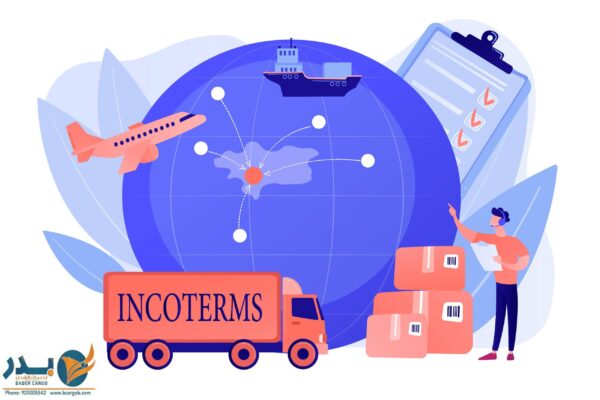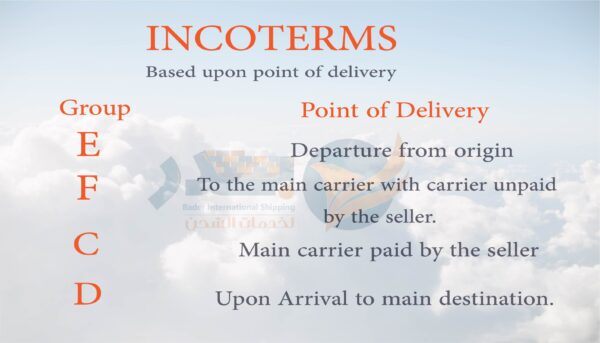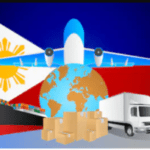INCOTERMS
It is the abbreviated form of Incoterms in Shipping and Transport. The contract of sale is used all over the world. INCOTERMS was first introduced in 1936 by the International Chamber of Commerce (ICC).
why do we need INCOTERMS؟
The shipment moves several months before reaching its destination. Although in recent years shipping has become much safer, some shipments still do not reach their destination or arrive in good condition. And when that happens, one must find out who lost the title of the goods. For this reason, it is very important for the seller and the buyer to define in advance the obligations and responsibilities that must be agreed upon. Incoterms are all possible ways to allocate obligations and responsibilities between two parties.
وتشمل هذه الالتزامات و المسؤوليات..
- نقطة التسليم: التجارة الدولية تحدد شروط نقطة تسليم البضائع من قبل البائع إلى المشتري. فمن شروط INCOTERMS تحدد نقطة انتقال الأيدي.اي نقل المخاطر والمسؤولية من قبل البائع الى المشتري .
-
تكاليف النقل: التجارة الدولية تحدد شروط الطرف الذي يدفع تكلفة النقل. تحدد INCOTERMS من يدفع مقابل أي جزء من النقل. فهناك اكثر من وسيلة شحن . وهذا في حالة النقل البحري.
- إجراءات التصدير والاستيراد: التجارة الدولية تحدد شروط (Incoterms) الطرف الذي يرتب إجراءات الاستيراد والتصدير.
- تكاليف التأمين: تحدد شروط التجارة الدولية (Incoterms) من يتحمل تكاليف التأمين.
كلها نقاط مهمة يجب تسليط الضوء عليها قبل المضي قدمًا.
الترتيب للنقل الرئيسي لا يعني أن الخطر يقع على عاتق الطرف المرتب. يجوز للبائع ترتيب النقل الرئيسي حتى عندما يتم تسليم الشحنة بالفعل (هذه هي المخاطر التي انتقلت إلى المشتري). في هذه الحالة ، تنتقل المخاطرة إلى المشتري ويقوم البائع بدور الشاحن دون أي مخاطر عليه.
الترتيب للتأمين لا يعني أن الخطر يقع على عاتق الطرف الذي يرتب التأمين. في القليل من شروط INCOTERMS ، يرتب البائع تأمينًا لتغطية مخاطر المشتري. في هذه الحالات ، يُطلب من البائع فقط تغطية الحد الأدنى من المخاطر على النحو المحدد في بند الحد الأدنى من المخاطر في مصطلحات التجارة الدولية ذات الصلة. يجب على المشتري الحصول على مزيد من التأمين لتغطية أي مخاطر إضافية يرغب في التأمين ضدها.
هناك إجمالي 11 INCOTERMS حددتها المحكمة الجنائية الدولية. على اعتبار مسؤولية البائع الأقل لأقل مسؤولية للمشتري. على سبيل المثال ،
تعتبر INCOTERM EXW (العمل السابق) أقل مسؤولية بالنسبة للبائع.
وتعتبر INCOTERM DDP (الرسوم الجمركية المدفوعة) أقل مسؤولية للمشتري.
فباقي شروط INCOTERMS التسعة الأخرى تقع بين الطرفين.
شيء واحد أخير قبل أن نتعامل مع مصطلحات التجارة الدولية وجهاً لوجه. دعنا نفرق ونجمع كل Incoterm معًا. أولاً على أساس طريقة النقل التي يتم استخدامها والثاني بناءً على نقطة التسليم.
المجموعة الأولى:
سبعة مصطلحات تجارية يمكن استخدامها في أي وسيلة نقل. يمكن استخدامها حتى في حالة عدم استخدام النقل البحري. تنتمي Incoterms EXW و FCA و CPT و CIP و DAT و DAP و DDP إلى هذه المجموعة.
المجموعة الثانية:
أربعة مصطلحات تجارية مستخدمة في البحر أو الممرات المائية الداخلية فقط. هذا لأنه في شروط التجارة الدولية هذه ، تكون نقطة التسليم ومكان الوجهة كلاهما موانئ بحرية. تنتمي Incoterms FAS و FOB و CFR و CIF إلى هذه المجموعة الثانية.
يمكن أيضًا تجميع مصطلحات Incoterms معًا في 4 فئات بناءً على نقطة التسليم
- المجموعة “E” (الأعمال السابقة) ، تكون نقطة التسليم هي مقر البائع.
- ثم المجموعة “F” (FOB ، FAS & FCA)، تكون نقطة التسليم قبل أو حتى شركة النقل الرئيسية، مع نقل الرئيسي دون دفع البائع.
- والمجموعة “C” (CFR و CIF و CPT و CIP) ، تكون نقطة التسليم أعلى من الناقل الرئيسي مع الناقل الذي يدفعه البائع.
- واخيرا المجموعة “D” (DAP و DAT و DDP) ، تكون نقطة التسليم هي الوجهة النهائية.
الآن بعد أن وضحنا بعض النقاط المهمة ، دعنا ننتقل إلى كل من incterms .
1. EXW (أعمال سابقة):
وسيلة النقل: متعددة
مع الأعمال السابقة ، يتحمل البائع أقل قدر من المسؤولية. يتحمل البائع مسؤولية تسليم البضائع إلى المشتري في مقر البائع أو المستودع أو أي أماكن أخرى متفق عليها. من هنا فصاعدًا ، تقع جميع المسؤوليات والمخاطر على عاتق المشتري. هذا يعني، نقطة التسليم هي مقر البائع
يدفع المشتري مقابل التصدير من مقر البائع والاستيراد إلى الوجهة.
المشتري يرتب لجميع وسائل النقل.
يدفع المشتري ثمن التأمين
غالبًا ما يتم استخدام الأعمال السابقة أثناء تقديم الأسعار الأولية لعقود البيع. من الناحية العملية ، يمكن أن يواجه هذا الإنكوتيرم صعوبات عملية خاصة في المهام عبر الحدود. قد تشمل هذه الصعوبات عدم قدرة المشتري على ترتيب إجراءات التصدير.
2- الرسوم المنجزة المدفوعة (DDP):
وسيلة النقل: متعددة
تسليم الرسوم المدفوعة DDP
الرسوم المسلمة المدفوعة هي عكس الأعمال السابقة. يتحمل البائع أكبر قدر من المسؤولية. يتحمل البائع مسؤولية تسليم البضائع في مقر المشتري أو المستودع أو أي مكان آخر كما هو متفق عليه. وهذا يعني أنه من مقر البائع إلى مباني المشتري أو أي مكان آخر متفق عليه
نقطة التسليم هي مقر المشتري أو مكان آخر متفق عليه.
يتعامل البائع مع البضائع ويدفع للتصدير وكذلك رسوم الاستيراد و
البائع يرتب نقل البضائع. مما يعني أيضًا أنه في حالة النقل البحري ، يكون البائع هو الشاحن للبضائع.
البائع يدفع مقابل التأمين.
كما هو الحال في الأعمال السابقة ، يمكن أن يواجه DDP أيضًا صعوبات عملية في المهام عبر الحدود. في DDP ، يكون البائع مسؤولاً عن مسح إجراءات الاستيراد ولكن البائع قد لا يكون لديه المعرفة والخبرة المحلية لتوضيح إجراءات الاستيراد.
3. شركة Free Carrier (FCA):
وسيلة النقل: متعددة
Free Carrier FCA
يعني الناقل المجاني أن نقطة التسليم هي شركة النقل أو أي شخص آخر يعينه المشتري في مقر البائع أو أي مكان آخر متفق عليه. إذا كان المكان المتفق عليه هو مقر البائع ، فسيتم التسليم عند تحميل البضائع على الشاحنة. إذا لم يكن المكان المتفق عليه هو مقر البائع ، فسيتم التسليم عندما تصل الشاحنة إلى هذا المكان وتكون جاهزة للتفريغ. في الناقل المجاني (FCA) ،
نقطة التسليم هي مقر البائع أو أي مكان آخر متفق عليه.
يدفع المشتري مقابل التصدير من مقر البائع والاستيراد إلى الوجهة.
المشتري يرتب لجميع وسائل النقل
في FCA incoterm ، المكان المتفق عليه له آثار على تحميل الناقل. إذا كان المكان المتفق عليه هو مقر البائع ، يتولى البائع عملية التحميل. إذا كان المكان المتفق عليه بخلاف مكان البائع ، فإن البائع قد قام بتسليم البضائع بمجرد وصول الناقل إلى المكان المتفق عليه.
قد تبدو “مقرات البائع FCA” مشابهة للأعمال السابقة ولكن هناك اختلاف رئيسي واحد. في FCA ، يلتزم البائع بتحميل البضائع على الناقل.
4. مجاني على متن الطائرة (FOB):
وسيلة النقل: البحر
مجاني على ظهر السفينة
تعني كلمة Free onboard أن البائع يسلم الشحنة إلى شركة النقل التي يحددها المشتري. لا يوجد سوى اختلاف بسيط بين FCA و FOB. اختلاف واحد هو طريقة النقل. في حين أن FCA ينطبق على النقل متعدد الوسائط ، يتم استخدام FOB فقط للنقل البحري. و FOB ، ينقل البائع المخاطر إلى المشتري عندما تعبر الشحنة حاجز السفينة. في FCA ، يلتزم البائع بتحميل الشحنة إلى شركة النقل التي يرتبها المشتري والتي تسبق شركة النقل الرئيسية.
5. التكلفة والشحن (CFR)
وسيلة النقل: البحر
التكلفة والشحن CFR
حسب التكلفة والشحن ، فهذا يعني أن البائع يتحمل تكاليف وشحن الشحن إلى الوجهة ولكن المخاطرة مع المشتري. وهذا أيضًا هو الفرق الرئيسي بين مصطلحات التجارة الدولية CFR و FOB. في FOB ، يسلم البائع الشحنة ويمرر المخاطرة إلى المشتري عندما تعبر الشحنة حاجز السفينة. ولكن ، في CFR ، يدفع أيضًا التكاليف والشحن حتى تصل الشحنة إلى الوجهة. كانت هذه بالضبط النقطة التي نوقشت في وقت سابق. الترتيب للنقل لا يعني أن الخطر يقع على عاتق الطرف الذي يرتب النقل. في هذه الحالة ، يقوم البائع بترتيب النقل الرئيسي (البائع هو الشاحن) ، ولكنه قد قام بالفعل بتسليم الشحنة أو نقل المخاطر إلى المشتري عند عبور الشحنة حاجز السفينة.
6. التكلفة والتأمين والشحن (CIF)
وسيلة النقل: البحر
التكلفة والتأمين والشحن CIF
لا يوجد سوى اختلاف واحد ولكن واضح بين CFR و CIF وهو إضافة التأمين. ينقل البائع المخاطرة إلى المشتري عندما يتم تحميل الشحنة على شركة النقل. لكن البائع يرتب أيضًا للناقل الرئيسي (البائع هو الشاحن). بصرف النظر عن ذلك البائع ، يدفع أيضًا تكاليف التأمين لتغطية مخاطر المشتري أثناء نقل الشحنة. بما أن البائع سيدفع لتغطية مخاطر المشتري ، فإنه يرغب في الحصول على أقل تأمين لمجرد تغطية التزاماته. يجب على المشتري أن يأخذ ذلك في الاعتبار وأن يأخذ تأمينًا إضافيًا إذا رغب في ذلك.
7. Free بجانب السفينة (FAS)
وسيلة النقل: البحر
إلى جانب السفينة FAS
بسيط كما يبدو. يقوم البائع بتسليم الشحنة إلى المشتري عندما تكون البضائع بجانب السفينة. تنتقل المخاطرة من البائع إلى المشتري عندما يتم إحضار السلعة مع السفينة. يرتب المشتري الناقل الرئيسي (المشتري هو الشاحن). يدفع المشتري جميع التأمين بعد هذه النقطة.
8. النقل المدفوع إلى (CPT)
وسيلة النقل: متعددة
النقل مدفوع إلى CPT
يدفع البائع ثمن النقل الرئيسي لإحضار الشحنة في المكان المتفق عليه. ومع ذلك ، ينقل البائع المخاطرة إلى المشتري عند التسليم إلى شركة النقل الرئيسية. هذه هي النقطة التي أبرزناها سابقًا. “الترتيب للنقل الرئيسي لا يعني أن المخاطرة مع الطرف المرتب”. هنا حتى عندما يقوم البائع بالترتيب للناقل الرئيسي ، فإن المخاطرة قد انتقلت بالفعل إلى المشتري.
يقوم المشتري أيضًا بترتيب التأمين من نقطة التسليم.
9. رسوم النقل والتأمين المدفوعة (CIP)
وسيلة النقل: متعددة
النقل والتأمين المدفوعة إلى CIP
في CIP ، يقوم البائع بتسليم البضائع ونقل المخاطر إلى المشتري عند التسليم إلى الناقل الرئيسي. يرتب البائع ويدفع لشركة النقل الرئيسية (البائع هو الشاحن) لإحضار الشحنة في المكان المتفق عليه. يرتب البائع أيضًا التأمين نيابة عن المشتري لتغطية مخاطر المشتري. الفرق الرئيسي بين CPT و CIP هو أن البائع يدفع التأمين أيضًا. مرة أخرى تم تسليط الضوء على هذه النقطة في وقت سابق. “الترتيب للتأمين لا يعني أن الخطر مع الطرف الذي يرتب التأمين”. هنا يدفع البائع مقابل التأمين ولكن الخطر ليس معه. يرتب البائع التأمين لتغطية مخاطر المشتري. يتطلب CIP من البائع أن يقوم بترتيب تأمين يساوي 110٪ من قيمة البضائع بموجب الحد الأدنى من مطالبة التأمين. يجب على المشتري تأمين نفسه ضد أي مخاطر إضافية يعتقد أنه يحتاج إلى تأمين ضدها.
10. التسليم في المكان (DAP)
وسيلة النقل: متعددة
سلمت في المكان
DAP يعني تسليم البائع عند وصول الشحنة إلى الوجهة النهائية ، ويكون جاهزًا للتفريغ من وسيلة النقل القادمة. يتحمل البائع جميع التكاليف والمخاطر في جلب البضائع إلى هذا المكان.
1) يتولى البائع رسوم التصدير والنقل والتأمين ورسوم ميناء الوصول.
2) يتحمل المشتري رسوم الاستيراد وتفريغ البضائع.
11. سلمت في المحطة (DAT)
وسيلة النقل: متعددة
سلمت في محطة DAT
يسلم البائع الشحنة وينقل المخاطرة إلى المشتري عندما يتم وضع الشحنة تحت تصرف المشتري في محطة الوجهة النهائية. يتولى البائع رسوم التصدير والنقل والتأمين ورسوم ميناء الوصول وتفريغ البضائع. يتمثل الاختلاف الرئيسي بين DAT و DAP في أنه في DAT ، يتعامل البائع مع التفريغ النهائي للبضائع.
الأخطاء الشائعة في استخدام المصطلحات التجارية الدولية:
1) عدم تضمين المكان الدقيق مع الوجهة.
استخدام المصطلحات التجارية الدولية يحتاج إلى تحديد المكان بدقة. على سبيل المثال ، لا تحدد FCA Durban الموقع الدقيق لأن ديربان منطقة واسعة. يجب أن تذكر Incoterm الموقع الدقيق في ديربان. على سبيل المثال ، FCA Durban berth no 42.
2) استخدام DDP incoterm دون مراعاة ما إذا كان البائع لديه المعرفة والخبرة أو إذا كانت اللوائح المحلية تسمح له بتخليص إجراءات الاستيراد في بلد المشتري.
3) استخدام الإنكوتيرم EXW دون مراعاة ما إذا كان المشتري لديه المعرفة والخبرة أو إذا كانت اللوائح المحلية تسمح له بإلغاء إجراءات التصدير في بلد البائع.
4) استخدام مصطلحات التجارة الدولية “البحرية أو الممرات المائية الداخلية” للبضائع المعبأة في حاويات. هذه المصطلحات الأربعة المستخدمة في الممرات المائية الداخلية والبحرية ليست مخصصة للبضائع المعبأة في حاويات. هذه في الواقع مخصصة للبضائع السائبة والبضائع غير المعبأة في حاويات. يمكن أن يؤدي استخدام مصطلحات التجارة الدولية هذه للبضائع المعبأة في حاويات إلى تعريض المصدرين لمخاطر لا داعي لها حيث قد تضطر البضائع إلى الانتظار عدة أيام قبل الإرسال.
واخيرا بما انها مصطلحات تعتبر مفهومة وثابته بالحروف الانجليزية سوف نضع اختصاراتها كاملة هنا:
EXW – Ex Works (insert place of delivery)
FCA – Free Carrier (Insert named place of delivery)
CPT – Carriage Paid to (insert place of destination)
CIP – Carriage and Insurance Paid To (insert place of destination)
DAP – Delivered at Place (insert named place of destination)
DPU – Delivered at Place Unloaded (insert of place of destination)
DDP – Delivered Duty Paid (Insert place of destination)
ولا تترد بالتواصل معنا في بدر الدولي للشحن لجميع استفساراتكم
info@bcargob.com
او عبر نموذج اتصل بنا بالاعلى









